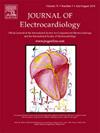使用人工智能对房颤进行心电图诊断的可能性:在COVID-19患者中使用PMcardio应用程序与窦性心律和其他心律失常进行区分
IF 1.3
4区 医学
Q3 CARDIAC & CARDIOVASCULAR SYSTEMS
引用次数: 0
摘要
人工智能(AI)已经显示出增强心电图分析的潜力,但其在检测COVID-19患者心房颤动(AF)方面的准确性仍未得到研究。鉴于该人群心律失常和血栓栓塞事件的风险增加,人工智能可以帮助及时正确诊断,减少不必要的咨询和检查,并最大限度地减少感染传播。本研究评估基于人工智能的PMcardio在检测COVID-19患者房颤中的诊断性能。方法采用纸质病历对116例连续住院的COVID-19患者进行分析,重点关注心电图。心律失常的存在和类型由经验丰富的心脏病专家确定,并与从患者医疗记录和PMcardio应用程序收集的传染病专家的评估进行比较。结果患者平均年龄为63.28岁(14.980岁)。PMcardio AI应用程序表现出完美的诊断性能,与心脏病专家的评估相比,AF检测的灵敏度和特异性为1.00。传染病专家表现出较低的敏感性(0.85),但保留了较高的特异性(0.97)。人工智能置信度评分和诊断准确性之间没有发现显著关联(p = 0.660),表明在各个置信度水平上的表现是一致的。此外,AI的严重程度分类与心律诊断显著相关(p <;0.001)。结论使用PMcardio进行ai驱动的心电图分析,可高度准确地检测出COVID-19患者的房颤,优于传染病专家,准确性与心脏病专家相当。人工智能在临床实践中的整合可以增强心律失常检测和简化诊断工作流程,特别是在资源有限和传染病环境中。本文章由计算机程序翻译,如有差异,请以英文原文为准。
Electrocardiographic diagnostic possibilities for atrial fibrillation using artificial intelligence: Differentiation from sinus rhythm and other arrhythmias with the PMcardio app in COVID-19 patients
Background
Artificial intelligence (AI) has shown potential in enhancing ECG analysis, but its accuracy in detecting atrial fibrillation (AF) in COVID-19 patients remains unstudied. Given the increased risk of arrhythmias and thromboembolic events in this population, AI could aid in timely correct diagnosis, reduce unnecessary consultations, tests, and minimize infection spread. This study evaluated the diagnostic performance of the AI-based PMcardio application in detecting AF in COVID-19 patients.
Methods
The study analyzed 116 hospitalized COVID-19 consecutive patients using paper-based medical records, with a particular focus on ECGs. The presence and type of arrhythmias were determined by an experienced cardiologist and compared with assessments by the infectious disease specialists collected from patient medical records and the PMcardio application.
Results
The mean patient age was 63.28 (14.980) years. The PMcardio AI application demonstrated perfect diagnostic performance, achieving a sensitivity and specificity of 1.00 for AF detection compared to cardiologist's evaluations. Infectious disease specialists showed lower sensitivity (0.85) but retained high specificity (0.97). No significant association was found between the AI confidence score and diagnostic accuracy (p = 0.660), indicating consistent performance across confidence levels. Additionally, the AI's severity classification correlated significantly with rhythm diagnoses (p < 0.001).
Conclusions
AI-powered ECG analysis using PMcardio highly accurately detected AF in COVID-19 patients, outperforming infectious disease specialists and matching cardiologist's accuracy. The integration of AI in clinical practice may enhance arrhythmia detection and streamline diagnostic workflows, particularly in resource-limited and infectious disease settings.
求助全文
通过发布文献求助,成功后即可免费获取论文全文。
去求助
来源期刊

Journal of electrocardiology
医学-心血管系统
CiteScore
2.70
自引率
7.70%
发文量
152
审稿时长
38 days
期刊介绍:
The Journal of Electrocardiology is devoted exclusively to clinical and experimental studies of the electrical activities of the heart. It seeks to contribute significantly to the accuracy of diagnosis and prognosis and the effective treatment, prevention, or delay of heart disease. Editorial contents include electrocardiography, vectorcardiography, arrhythmias, membrane action potential, cardiac pacing, monitoring defibrillation, instrumentation, drug effects, and computer applications.
 求助内容:
求助内容: 应助结果提醒方式:
应助结果提醒方式:


